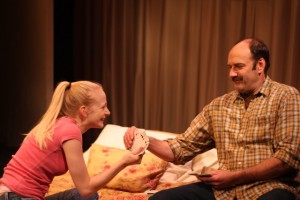
THE ETHICS OF MURDER
Steven Michael Walters’ (Glenn Reed on NBC’s Friday Night Lights) The Girl from Nashville, marketed as a Southern Gothic tragedy, is adequately southern and adequately tragic, but takes the gloomy part of Gothic to the extreme. A deconstructed story about what appears at first to be a senseless murder, this production’s scenes melt effortlessly into each other, but it’s the action in between that could use more movement.
Split between alternating scenes in a Texas motel and a police station’s interrogation room, The Girl from Nashville unfurls so slowly that it teeters on the edge of boring. Much like the opening scenes in The Pillow Book, the play begins with a lot of intrigue surrounding a violent murder of youngsters, in this case a star quarterback and his fellow teammate, but the thrill ends there. Instead, Walters takes us on a roundabout journey through the valleys of right and wrong that ends in a morally confusing, profound place, but reveals important details a bit too gingerly along the way.
 The subject of the audience’s ethical dilemma is Weldon Brown (Brad Makarowski), the married-with-kids coach of the football team that beat one of his players to death and accidentally caused the death of another. If that isn’t bad enough, soon after the murder, he hides out in a seedy motel with Lissie (Erin Wilhelmi), a troubled foster kid and one of his diminutive students that looks younger than her 16 years despite her advanced intelligence. Regardless of Makarowski’s earnest performance, Weldon seems primed to be demonized until we find out in Act Two why he killed that college-bound boy.
The subject of the audience’s ethical dilemma is Weldon Brown (Brad Makarowski), the married-with-kids coach of the football team that beat one of his players to death and accidentally caused the death of another. If that isn’t bad enough, soon after the murder, he hides out in a seedy motel with Lissie (Erin Wilhelmi), a troubled foster kid and one of his diminutive students that looks younger than her 16 years despite her advanced intelligence. Regardless of Makarowski’s earnest performance, Weldon seems primed to be demonized until we find out in Act Two why he killed that college-bound boy.
 With a sound premise, appropriately intimate theater space, and Kristine Ayers’ tight direction, almost all of the ingredients are there to draw you into the story. The 5-member cast are all talented performers. Wilhelmi is solid as the sweet Lissie, and Dan Sharkey plays Jim, Weldon’s father, with a comfortable balance of remorse and skeeze. Even if Montgomery Sutton’s stature makes it difficult to buy him as Jake, the “bad cop” that questions Weldon and menacingly circles the much taller Makarowski, his acting is admirable. Is spite of her competence playing the role, the casting choice to have Jessica Renee Russell play Jessica Ritter, the public defender assigned to Weldon, would have been questionable as well because of her youthful looks, but the script cleverly addresses this concern.
With a sound premise, appropriately intimate theater space, and Kristine Ayers’ tight direction, almost all of the ingredients are there to draw you into the story. The 5-member cast are all talented performers. Wilhelmi is solid as the sweet Lissie, and Dan Sharkey plays Jim, Weldon’s father, with a comfortable balance of remorse and skeeze. Even if Montgomery Sutton’s stature makes it difficult to buy him as Jake, the “bad cop” that questions Weldon and menacingly circles the much taller Makarowski, his acting is admirable. Is spite of her competence playing the role, the casting choice to have Jessica Renee Russell play Jessica Ritter, the public defender assigned to Weldon, would have been questionable as well because of her youthful looks, but the script cleverly addresses this concern.
Tsubasa Kamei’s lighting design is also remarkable, particularly with the motel scenes. Not only does it perfectly convey the flashing sign effect of a motel without an actual sign, but it frames the stage with shadows that are in tune with the darkness in the story.
 Unfortunately, the tone and the development of the plot makes it difficult to stay invested. The Girl from Nashville is potentially powerful work. It constantly prods you with “what would you do?” and provides you with grey, weighty circumstances that make the decisions difficult. If only it could keep the same momentum with relaying the narrative.
Unfortunately, the tone and the development of the plot makes it difficult to stay invested. The Girl from Nashville is potentially powerful work. It constantly prods you with “what would you do?” and provides you with grey, weighty circumstances that make the decisions difficult. If only it could keep the same momentum with relaying the narrative.
cindypierre @ stageandcinema.com
photos by Kristine Ayers
The Girl from Nashville
scheduled to close December 18 at time of publication
for tickets, visit http://www.ebeensemble.com/
